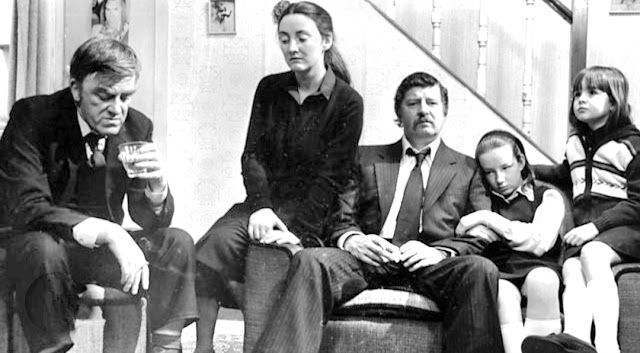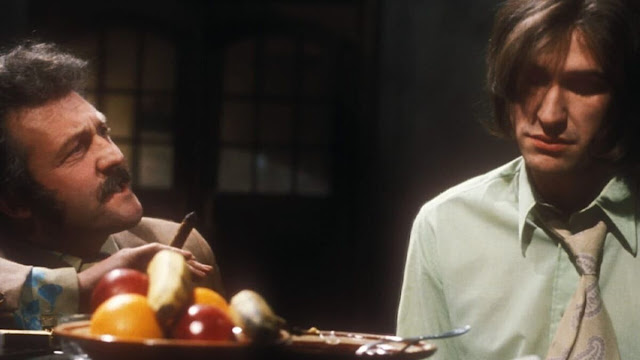The Billy Trilogy
When Phil told me we'd be watching the trilogy of plays that launched the career of Kenneth Branagh, I was excited, as I'm a fan of Branagh. Some twenty minutes into the first of the three plays, I began to have severe doubts. However, by the end of the trilogy, I decided it was a triumph, while at the same time having been bored stiff quite a lot of the time and finding large chunks of it melodramatic and quite unpleasant. It is the great mystery of theatre that things that are a bit of an endurance test can also be things you do not regret having seen.
The three plays are all set in Belfast in the late 1970s. As the first and second open, this is explained on the screen, the "1970s" acquiring an apostrophe in the second one, while the playwright's name, Graham Reid, sheds an initial "J." between Play One and Play Two. Most of the action takes place in the tiny front room of a small terrace house, where the Martin family - Norman, the father, and Billy, Lorna, Ann and Maureen, his children, live. Janet, Norman's wife and the children's mother is in hospital during the first play. There is a great deal of fighting and shouting about her and about who should visit her. When she dies, Norman leaves for England, and Billy and Lorna are left in charge of their little sisters. In the second play, the brother of Janet comes to live in the household, and Billy has to decide whether to move in with a girl friend or return to the girl friend we saw him with in Play One. In the third play, Norman returns from England with a new wife and the intention of taking his youngest daughters to live with him, causing more fighting, although without quite as much violence as in the initial play. Norman, it has to be said, is not a very nice man.
The Martin family are Protestant, and yet the plays seem to me to be soaked in Catholicism, at least in their presentation of the adult female characters of the Martin family. The scenes showing Janet in hospital looked as if they had been shot intentionally to make her look like the Virgin Mother. Similarly, Lorna seems less a real character than a Catholic symbol, the young female who looks after everyone, a nun without a nun’s habit.The plays are not comforting in any way, which is probably why I didn't warm to them initially, even though I ended up admiring them. I suppose, if one were trying to categorise them, they would fall into the category labelled “kitchen sink drama”. To put it another way, they are the polar opposite of Downton Abbey, where a large part of the appeal is the attractiveness of the setting. The world of 1970s Belfast is brought vividly to life, but, given the utter dreariness of Belfast's terraced streets, vivid is possibly not the right word. There are no trees, the sun never seems to shine, everything is drab. Drink seems to be the only form of entertainment, (followed by very violent fighting) - unless you count playing draughts with Uncle Andy, the brother of Janet. If you are a non-drinker, you must survive on oceans of tea.
So what makes these plays worthwhile? The performances, first and foremost, (with one exception – the mother of Billy’s girlfriend in Play One, who struck me as pitching her acting to a theatre stage, rather than a film set). Loathsome though I found the character he plays, James Ellis as Norman is brilliant - the very fact that he made me so cross is proof of that. Branagh is also good, as is Colum Convey as his idiot best friend Ian. Brid Brennan as Lorna is tremendous, making an unbelievably self-sacrificing character entirely believable – it seemed to me that her character ought to have been the central focus of the trilogy, but perhaps that is simply because I am a female and generally tend to be more interested in the lives of other women than those of men. Meanwhile, the two youngest in the family bring the whole thing alive, which is very unusual, as child actors so often bring down the level of a production. As Branagh says about them in a video accompanying the plays on BBC iPlayer, they are “little beacons of truth”. I should add that Uncle Andy, despite have extremely disgusting personal habits, thanks to a wonderful performance by Mark Mulholland, became my favourite character of the large cast.Before watching the Billy plays, I didn't have any illusions that working class Belfast was a particularly pleasant place in the 1970s, but these dramas bring home the relative poverty and constant undercurrent of violence - not simply from the Troubles, but within the working class culture of Belfast (indeed, the Troubles are barely mentioned). However, if that sounds relentlessly grim, I should add that there is a lot of humour too, particularly from the younger cast members.
Why should anyone want to watch the Billy trilogy? Because it's great drama. It takes us inside a world that would usually be closed to us and explores the complex relationships within a dysfunctional family, allowing us to see below the surface and understand something of the world they inhabit. The first play is particularly hard to watch, but there is also love, humour and compassion. And ultimately, there is a form of redemption for Norman, against all the odds.





Comments
Post a Comment